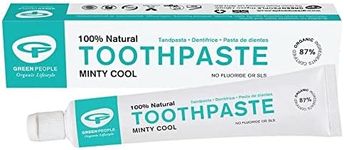Buying Guide for the Best Non Fluoride Toothpastes
Choosing the right non-fluoride toothpaste can be a bit overwhelming with the variety of options available. Non-fluoride toothpastes are a great alternative for those who prefer to avoid fluoride due to personal preferences or health concerns. When selecting a non-fluoride toothpaste, it's important to consider several key specifications to ensure you get the best product for your dental needs. Here are some important factors to consider and how to navigate them.IngredientsIngredients are crucial in determining the effectiveness and safety of a non-fluoride toothpaste. Look for natural and safe ingredients like baking soda, xylitol, essential oils, and herbal extracts. These can help in cleaning teeth, freshening breath, and preventing cavities. Avoid toothpastes with harsh chemicals, artificial sweeteners, and preservatives. If you have allergies or sensitivities, check the ingredient list carefully to avoid any adverse reactions.
AbrasivenessAbrasiveness refers to how well the toothpaste can remove plaque and stains from your teeth. It's measured by the Relative Dentin Abrasivity (RDA) value. Low abrasiveness (RDA below 70) is gentle and suitable for sensitive teeth, while medium (RDA 70-100) and high abrasiveness (RDA above 100) are better for removing tough stains but can be harsh on enamel. Choose a toothpaste with the right level of abrasiveness based on your dental needs and sensitivity.
FlavorFlavor is an important aspect of toothpaste as it affects the overall brushing experience. Non-fluoride toothpastes come in various flavors like mint, cinnamon, citrus, and herbal blends. If you have a preference for a particular flavor, choose one that makes brushing enjoyable for you. For children, opt for mild and pleasant flavors to encourage regular brushing habits.
Whitening PropertiesWhitening properties in toothpaste help to remove surface stains and brighten your smile. Non-fluoride toothpastes may contain natural whitening agents like baking soda or activated charcoal. If you are looking to improve the appearance of your teeth, choose a toothpaste with effective whitening ingredients. However, be cautious if you have sensitive teeth, as some whitening agents can be abrasive.
Sensitivity ReliefSensitivity relief is important for those who experience discomfort or pain when consuming hot, cold, or sweet foods. Non-fluoride toothpastes may contain ingredients like potassium nitrate or strontium chloride that help to reduce sensitivity. If you have sensitive teeth, look for a toothpaste specifically formulated to provide relief and protect your enamel.
Anti-Plaque and Anti-GingivitisAnti-plaque and anti-gingivitis properties help to prevent the buildup of plaque and reduce the risk of gum disease. Non-fluoride toothpastes may contain antibacterial agents like tea tree oil or xylitol that inhibit the growth of bacteria. If you are prone to plaque buildup or gum issues, choose a toothpaste with strong anti-plaque and anti-gingivitis benefits.
Certifications and ClaimsCertifications and claims on toothpaste packaging can provide assurance about the product's quality and safety. Look for certifications from reputable organizations like the American Dental Association (ADA) or other health authorities. Claims such as 'natural,' 'organic,' or 'cruelty-free' can also guide you in choosing a product that aligns with your values and preferences.















